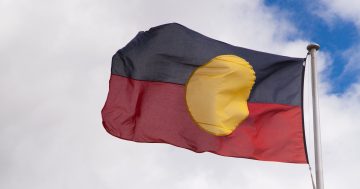
The team from the Canberra Indigenous Business Network (from left) Craig Sams, Jo Kamira, Belinda Kendall and Rachelle Towart. Photo: Canberra Indigenous Business Network.
Reconciliation Day is often thought of as a day for big-picture thinking and action at a local government or Federal Government level.
But Canberra Indigenous Business Network (CIBN) co-founder and chair Belinda Kendall says it is also a day when every Australian should sit back and reflect on the actions they take in their own lives.
“For me, reconciliation should be ‘conciliation’ as we’ve never been ‘conciled’ before,” she says. “Now, it should be about Australians coming together and working together to support equity.”
CIBN began as a simple idea to bring Aboriginal and Torres Strait Islander businesses based in Canberra and the surrounding area together to improve collective outcomes, and it has since grown considerably.
Despite this growth, the original goal remains the same.
With more than 35 member businesses, CIBN is the largest representative body for Aboriginal and Torres Strait Islander business in the ACT.
“We want non-Aboriginal people and businesses to take notice of, and value, Aboriginal and Torres Strait Islander businesses which are offering high-quality, professional services,” says Belinda.
She urges Canberrans to take the opportunity during Reconciliation Week to learn about Indigenous businesses and engage with their offerings.
Belinda says CIBN focuses on relationships.
“At the heart of Aboriginal and Torres Strait Islander culture is a foundation of relationships – no matter whether these are with the environment, people or spirituality,” she says.
“Keeping these strong and healthy underpins everything. We take the same approach to business.”
Capital Workplace is one of the 35 businesses CIBN represents. Principal Jo Kamira says it’s all about treating people as people, first and foremost.
“We never see any business as a number,” she says. “Instead, we care about the people who run it and we want to ensure the relationship succeeds.”
Belinda explains that CIBN’s aim is to operate in an entirely collaborative fashion.
“This is in line with traditional Aboriginal and Torres Strait Islander cultural practices as it’s not about one person speaking on behalf of everybody else or taking the lead and making decisions on behalf of the whole group,” she says.
“Instead, we all had an idea which we put out to all the Aboriginal and Torres Strait Islander businesses and we came together as a collective to work out what it should look like.”
CIBN initially had 20 to 30 people show interest.
As all of the participating businesses are small, collaboration means they are able to considerably expand their growth and harness collective bargaining power.
Belinda explains each member shares their expertise with the group, whether that’s about governance and the corporate world, media, professional services, IT or anything else.
“Being able to collaborate and work together on larger projects is great and working together is also key for improving Aboriginal and Torres Strait Islander outcomes,” she says.
Jo says another of the group’s successes is they refer business to one another.
“If somebody says to us, ‘We need some conferencing and mediation,’ I know exactly where to go and who to recommend because of CIBN,” she says.
Belinda adds that participating businesses also do what they can to actually use one another’s services.
“One of our member businesses is our cleaner, and we’ve also had a whole range of our IT businesses who have provided us with support,” she says.
Belinda gives the example of Capital Workplace which, during the COVID-19 pandemic, offered information and support to many CIBN businesses.
For more information, visit Canberra Indigenous Business Network.





















